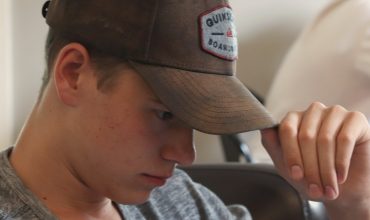
As parents, it’s understandable that we want the best for our children. We want them to thrive, be happy and excel in everything they do. But sometimes, trying to help your child yourself isn’t enough.
There are times when it can be more than just normal anxiety, and during those times, it’s important to seek medical advice. If you feel that you and your teen may be at a point in time where medical advice is needed, here are just a few of the signs to look for.
Why are so many teens suffering from anxiety?
There is no one-size-fits-all answer to this question, as anxiety can have many different causes and can manifest differently in different individuals. However, many factors contribute to anxiety in teenagers:
-
Social media: Social media can create pressure for teens to present a certain image or persona online, which can lead to anxiety and a fear of not measuring up. It can also expose them to cyberbullying, which can be a significant source of stress and anxiety.
-
Academic pressure: Teens today face significant pressure to succeed academically, whether it’s getting good grades, preparing for standardized tests, or getting into a good college. This pressure can lead to high levels of stress and anxiety.
-
Uncertain future: Many teens today face an uncertain future, with concerns about job prospects, the economy, and the state of the world. This chaos can lead to feelings of anxiety and hopelessness.
-
Family issues: Teens may face stress and anxiety related to family issues such as divorce, parental conflict, financial struggles, or other problems at home.
-
Hormonal changes: Hormonal changes during puberty can contribute to mood swings and anxiety in some girls.
It’s important to note that anxiety is a complex issue, and the causes can vary from person to person. What can be a mild symptom in one teenager could be a red flag for another.
How to know the difference between typical anxious behavior and when to consult a professional
If your teen becomes extremely closed off and refuses to communicate, it may be time to seek medical advice.
Anxiety can take on many different forms. If your teen starts to completely transform into a person that you can’t talk to or don’t even recognize anymore, it may be time to seek outside help from a professional. Anxiety can happen to all of us, but when it overtakes and changes who you are, that can be a big signal that medical advice is needed.
If your teen starts talking about hurting themselves physically, or you’ve noticed that they are hurting themselves physically already, it’s time to seek medical advice.
Any time that anxiety takes a turn for the worse and causes your teen to start engaging in physical harm, it’s time to act quickly. Thinking that you have control of the situation isn’t always the best route. Your teen may be able to connect and learn better from an outside professional. While that may seem confusing to you at the time, just remember that everything that you are trying to do for your teen is with the intent of doing what is best for them.
Seeking outside guidance and advice if your teen’s anxiety is starting to link with depression is important.
If your teen refuses to leave the house or has lost interest in social outings that they used to love. It may be time to seek medical advice.
Keeping a close eye on your teen is important when they have shown signs of anxiety. You’ll want to make certain that you are monitoring how active or inactive they are becoming. Anxiety doesn’t have to stop your teen from doing the things that they love doing. But, if it starts to become severe enough, it will.
Anxiety can be overcome. It can be beaten. BUT, it takes patience, persistence, and constant work to do so. If your teen starts to shy away and becomes closed off it’s important to act quickly in seeking medical advice.
By asking for outside help in situations, you can start to try to alleviate some of these anxiety symptoms and worries for your teen. Truthfully, your teen may actually welcome some outside help. They may view it as a fresh set of eyes and ears from someone outside the household.
If your teen starts to show any of the signs above, it may be time to seek medical advice. Go with your gut and follow your parental instincts on how to proceed with your child. Don’t worry about what anyone else will think in the outside world. The most important aspect of your child having anxiety is finding a way to help them learn how to manage it, and overcome it.
Not sure where to go for help? The following link provides many resources to help manage teen mental health issues: Society for Adolescent Mental Health
Parenting Teens and Tweens is Tough, Want A Little More Support?
How To Have A More Peaceful Relationship With Your Teen ; Guaranteed
Signs Of Teenage Depression And How To Help







Very important information written in this article. I believe clinical anxiety is sometimes misconstrued as teenage angst by some people. And I think it’s important that people know, even though anxiety can be overcome, if it’s not treated it will get worse. And untreated anxiety leads to other problems in people.
fj3icb
al57np
v5n6w0
f8ag8z
8gn8c5
omhpd7
05019j
pf4w08
kr2nff
q95plx
wac1i4